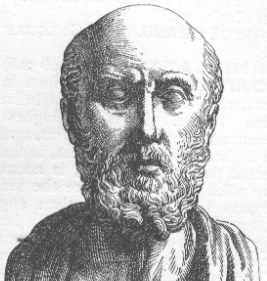



Physician Roles, Responsibilities and Privileges
Over time society and the profession have grappled with defining what a physician is. We present some examples, of which CanMEDS is one. Take a look at the different responsibilities and privileges expected of a physician, where they overlap and where they make new statements.
Hippocratic Oath

The Hippocratic Oath is believed to have been written by Hippocrates and requires a new physician to swear that they will uphold specific ethical standards. It has a mythical place in the training and practice of physicians. It evokes a an image of ancient guilds and a code of ethics that transcends time and geography. It is used inconsistently and as some areas of the Oath are subject to debate, it has been replaced at some schools by a ’white coat ceremony’ at the beginning of medical school.
Hippocratic Oath [1]
I swear by Apollo the physician, and Ascelepius, and Hygieia and Panacea[2] and all the gods and goddesses as my witnesses, that, according to my ability and judgement, I will keep this Oath and this contract:
To hold him who taught me this art equally dear to me as my parents, to be a partner in life with him, and to fulfill his needs when required; to look upon his offspring as equals to my own siblings, and to teach them this art, if they shall wish to learn it, without fee or contract; and that by the set rules, lectures, and every other mode of instruction, I will impart a knowledge of the art to my own sons, and those of my teachers, and to students bound by this contract and having sworn this Oath to the law of medicine, but to no others.
I will use those dietary regimens which will benefit my patients according to my greatest ability and judgement, and I will do no harm or injustice to them.
I will not give a lethal drug to anyone if I am asked, nor will I advise such a plan; and similarly I will not give a woman a pessary to cause an abortion.
In purity and according to divine law will I carry out my life and my art.
I will not use the knife, even upon those suffering from stones, but I will leave this to those who are trained in this craft.
Into whatever homes I go, I will enter them for the benefit of the sick, avoiding any voluntary act of impropriety or corruption, including the seduction of women or men, whether they are free men or slaves.
Whatever I see or hear in the lives of my patients, whether in connection with my professional practice or not, which ought not to be spoken of outside, I will keep secret, as considering all such things to be private.
So long as I maintain this Oath faithfully and without corruption, may it be granted to me to partake of life fully and the practice of my art, gaining the respect of all men for all time. However, should I transgress this Oath and violate it, may the opposite be my fate.
A Modern Physicians Oath
The World Medical Association developed a "modern" version of the Hippocratic Oath in 1948. This "Declaration of Geneva" [3] was initiated post World War II and adopted by the various member countries. It was hoped that this oath would be taken upon receiving one’s certification in medicine at the end of medical school.
Declaration of Geneva
At the time of being admitted as a member of the medical profession:
I solemnly pledge to consecrate my life to the service of humanity;
I will give to my teachers the respect and gratitude that is their due;
I will practise my profession with conscience and dignity;
The health of my patient will be my first consideration;
I will respect the secrets that are confided in me, even after the patient has died;
I will maintain by all the means in my power, the honour and the noble traditions of the medical profession;
My colleagues will be my sisters and brothers;
I will not permit considerations of age, disease or disability, creed, ethnic origin, gender, nationality, political affiliation, race, sexual orientation, social standing or any other factor to intervene between my duty and my patient;
I will maintain the utmost respect for human life;
I will not use my medical knowledge to violate human rights and civil liberties, even under threat;
I make these promises solemnly, freely and upon my honour.

_________________________________
2. Aesculapius, the god of healing and medicine, is the son of Apollo and father of Goddess of health Hygieia and Goddess of cures Panacea. http://en.wikipedia.org/wiki/Hippocratic_Oath http://en.wikipedia.org/wiki/Hygeia http://en.wikipedia.org/wiki/Panaceia accessed November 12, 2007
3. The Declaration of Geneva, World Medical Association Adopted by the 2nd General Assembly of the World Medical Association, Geneva, Switzerland, September 1948 and amended by the 22nd World Medical Assembly, Sydney, Australia, August 1968 and the 35th World Medical Assembly, Venice, Italy, October 1983 and the 46th WMA General Assembly, Stockholm, Sweden, September 1994 and editorially revised at the 170th Council Session, Divonne-les-Bains, France, May 2005 and the 173rd Council Session, Divonne-les-Bains, France, May 2006 www.wma.net/e/policy/c8.htm accessed November 15, 2007
 Previous
Previous